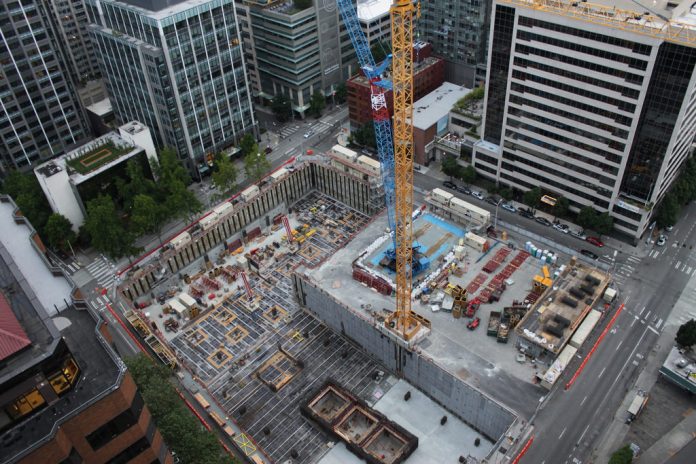Seattle Councilmember Mike O’Brien revealed today that Seattle’s incentive zoning program has been shortchanged by $3.4 million due to inaccurate reporting, discovered via an investigation by the City Auditor.
Incentive Zoning is a program wherein developers voluntarily contribute to the City’s affordable housing fund in exchange for extra floor area for their projects. In December, we reported that incentive zoning appeared to bring in $32 million in 2016, while the 2015 returns were almost as big. It came to Councilmember O’Brien’s attention that those number perhaps should have been larger.
“Two years ago, I stood with UNITE HERE Local 8 who raised concerns over missed opportunities for greater affordable housing contributions from hotel developments like the proposed R.C. Hedreen Co. hotel in the Denny Triangle,” O’Brien said in a press release. “The findings shared today by the Auditor demonstrate that the complexities of the Incentive Zoning program have left a lot of room for improvement in administering the policies. Now that we’ve identified the clear problems, it’s time to correct them.”
The audit suggests City departments have inaccurate accountings of projects that have made, or were required to make, affordable housing contributions. “Furthermore, developers for at least ten projects failed to pay for or finalize performance agreements to provide affordable housing units at earlier stages of the permitting process,” the press release stated. “As a result of the audit uncovering unfulfilled payments, the City sought and received a payment totaling $3.7 million for affordable housing (including interest) in November 2016.”
As Councilmember O’Brien alluded, potential weaknesses of enforcing the program came to light thanks to research conducted by the union UNITE HERE Local 8. Daniel Beekman reported in The Seattle Times:
UNITE HERE Local 8 came across the case while investigating the development of a new hotel in the Denny Triangle neighborhood. The union realized the city was planning to demand a $9 million payment when it could have charged $12 million.
The city ultimately agreed to seek $12 million after a legal challenge by the union. But the case raised questions about Incentive Zoning, says Stefan Moritz, Local 8’s director of strategic affairs. The city wasn’t calculating developer contributions in a very transparent way.
Local 8 was interested partly because most of the union’s members are low-wage workers who qualify for the subsidized housing generated by the program.
Beekman reported that incentive zoning “netted $6.6 million in payments in 2013, $21 million in 2014 and nearly $26 million in 2016.” That would mean the $32 million number I extrapolated from the Murray press release in December was apparently $6 million too high; the extra $6 million must have came from other unspecified sources.
Councilmember O’Brien highlighted the following key findings from the Auditor’s report:
- “Discrepancies, errors, and missing information in documents and systems used as the basis to determine or track extra floor area and affordable housing contributions, as well as other record keeping weaknesses, which contributed to a lack of transparency and inaccurate reporting.”
- “No formal process exists for the City to revise contributions to affordable housing when building plans changed. Therefore, developers may not have provided the City an accurate affordable housing contribution.”
- “Elements of the Land Use Code related to incentive zoning for affordable housing are complex, unclear and conflicting elements of the Land Use Code and required staff interpretation, making customer service and uniform application of the program’s implementation difficult.”
He reports that the Seattle Department of Construction and Inspections (SDCI) and the Office of Housing (OH) will submit work plans to respond to the Auditor’s finding. They will also make progress reports to Council to guard against the mistakes being repeated and ensure the program is implemented properly. The work plans includes mention of the following remedies:
- “An update of departmental policies to prevent payment and data errors, and decrease fraud risk;
- Increased reporting requirements that include additional metrics and that are made accessible to the public;
- Sharing a regularly updated list of projects that have contributed to incentive zoning;
- Clear process and review guidelines for applicants; and
- Potential changes to the land use code.”
Finally Councilmember O’Brien said the Planning, Land Use and Zoning Committee will review the audit findings at its next regularly scheduled meeting on Tuesday, April 18th at 9:30am and “representatives from SDCI and OH will join the Auditor to present how they intend to respond to the Auditor’s findings.”
Efficient administration of the program would show the City is up to the even bigger challenge of managing the Mandatory Housing Affordability (MHA) program which has thus far been enacted in the University District, Downtown, and South Lake Union, plus in a handful of contract rezones scattered around the city. As upzones bring MHA live in more and more neighborhoods, the administrative undertaking will get larger and larger; so, it’s good the City is tackling these issues now.
The featured image is by Sounder Bruce via Flickr and depicts the Hedreen hotel construction site.
Doug Trumm is publisher of The Urbanist. An Urbanist writer since 2015, he dreams of pedestrian streets, bus lanes, and a mass-timber building spree to end our housing crisis. He graduated from the Evans School of Public Policy and Governance at the University of Washington in 2019. He lives in Seattle's Fremont neighborhood and loves to explore the city by foot and by bike.




